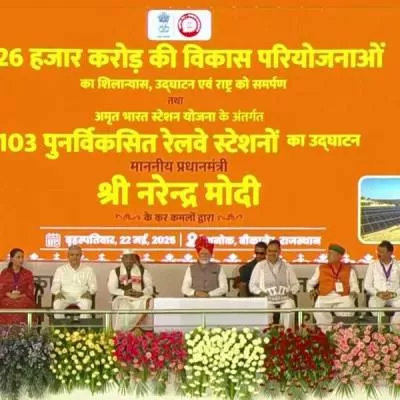
Mumbai, May 26 -- Prime Minister Narendra Modi inaugurated, dedicated, and laid the foundation stone for a series of development projects worth Rs 260 billion in Bikaner, Rajasthan. Addressing a vast gathering that included participants from 18 states and union territories, the Prime Minister celebrated the scale and diversity of engagement at the event, which marked a significant milestone in India's infrastructure and economic growth.
At the heart of the programme was a focus on rail, road, electricity, and clean energy infrastructure. The Prime Minister noted that India has increased infrastructure investment sixfold over the past 11 years, highlighting iconic projects such as the Chenab Bridge in the north, Atal Setu in the west, and the soon-to-be-completed Delhi-Mumbai Expressway. He also underscored the expansion of modern trains like Vande Bharat, Amrit Bharat, and Namo Bharat across nearly 70 routes.
Modi inaugurated 103 redeveloped Amrit Bharat railway stations in 86 districts, part of an initiative to modernise over 1,300 stations across India with regionally inspired architecture and enhanced passenger amenities. Examples include Deshnoke station in Rajasthan, inspired by temple architecture, and Begumpet station in Telangana, reflecting Kakatiya design.
The Prime Minister laid the foundation stone for electrification works on several key railway lines and inaugurated completed electrified routes including Suratgarh-Phalodi and Samdari-Barmer. The Indian Railways is progressing towards 100 per cent electrification for greater efficiency and environmental sustainability.
In road infrastructure, seven completed projects were dedicated to the nation, and work began on three vehicle underpasses and the widening of several national highways. These Rs 48.5 billion initiatives aim to improve regional connectivity and strengthen accessibility to the Indo-Pak border.
Several power projects were launched, including solar plants in Bikaner and Nawa, and transmission systems under PowerGrid. These are designed to support India's clean energy transition and provide reliable electricity to rural and industrial areas. The PM also highlighted the success of the PM Surya Ghar Muft Bijli Yojana, under which over 40,000 households in Rajasthan are now generating solar power and saving on electricity bills.
Key state-level developments included upgrades to over 750 km of state highways, new power projects in Bikaner and Udaipur, and the inauguration of nursing colleges in Rajsamand, Pratapgarh, Bhilwara, and Dholpur. Water infrastructure projects launched include the Rural Water Supply and Fluorosis Mitigation Project in Jhunjhunu and restructuring of water supply schemes in Pali.
In terms of defence and strategic infrastructure, the Prime Minister noted that border roads and highways were being upgraded to support troop movement and national security. He also pointed to the economic potential of projects like the six-lane Amritsar-Jamnagar Economic Corridor and the near-complete Delhi-Mumbai Expressway.
On the national security front, Modi referred to the recent terrorist attack in Pahalgam and India's firm response via Operation Sindoor, during which Indian forces eliminated nine terrorist hideouts within 22 minutes. He reiterated that India will no longer distinguish between terrorist actors and their state sponsors, and warned Pakistan that further acts of terror would come at heavy economic and military cost.
He concluded by reaffirming his commitment to strengthening every part of India through development, job creation, and decisive action against terrorism. "This is a new India, one that builds with strength and responds with resolve," said the Prime Minister.
Published by HT Digital Content Services with permission from Construction World.
